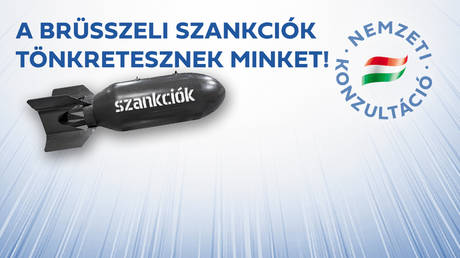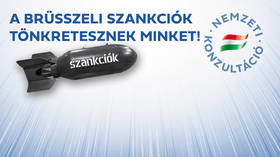EU nation’s Facebook likens sanctions to bomb
A strong anti-sanctions message on the Hungarian government’s official Facebook has polarized followers

EU nation’s Facebook likens sanctions to bomb

Hungary has issued a condemnation of EU sanctions against Russia, posting an image on its official government Facebook page likening the economic measures to a bomb and warning that Brussels’ financial warfare against Moscow will “destroy” Budapest.
The graphic, which features a warhead emblazoned with the Hungarian word for “sanctions” and the message “Brussels sanctions will destroy us,” was added on Saturday to accompany the government’s latest national consultation survey, which asked citizens whether they agreed with Budapest’s stated opposition to EU sanctions on Russia.
The image quickly attracted a torrent of commentary, much of it hostile. Many pointed out that despite PM Viktor Orban’s condemnations, his government had actually voted to approve the sanctions, as had all EU members. Others merely criticized the imagery as tasteless, noting that Ukrainians just one country over were dodging actual bombs while Orban complained.
Orban has argued the sanctions on Russia are having a more devastating effect on Europe by driving up energy prices and destabilizing the market. His government has strenuously lobbied for exceptions to the restrictions and managed to avoid the latest sanction package’s price cap, imposed on seaborne Russian energy supplies, because it receives gas via pipeline.
One survey asked the respondents if they agreed with potential sanctions imposed by “Brussels leaders” that would “put at risk household heating and the European economy’s ability to operate.” Another blamed sanctions for soaring food prices and “increasing the risk of starvation in developing countries,” which in turn “leads to increasing migration pressure” on Europe.
Hungarian FM Peter Szijjarto earlier this month defended maintaining ties with Moscow, pointing out that someone had to keep Hungarians warm during the winter. The Central European nation receives a whopping 80% of its gas from Russia, more than most other EU countries, receiving its supply via the TurkStream pipeline, which also serves Serbia. Szijjarto has warned the gas shortage facing Europe this winter will extend beyond 2024, calling it “the first global energy crisis in history.”












